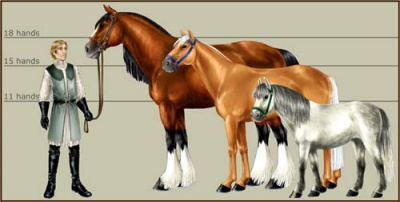(Created page with "= {{PAGENAME}} = {{Banner|image=|link=}} Nothing is more important to the knight than his horse. A common saying amongst some knights is “I can always find another wife, a...") |
|||
| Line 14: | Line 14: | ||
Horse size vary a lot, but are mostly small by modern comparison. The greatest horses are around 16-18 hands tall, a normal riding horse around 15. And a cart-horse or donkey around 10-12 hands. See chart. | Horse size vary a lot, but are mostly small by modern comparison. The greatest horses are around 16-18 hands tall, a normal riding horse around 15. And a cart-horse or donkey around 10-12 hands. See chart. | ||
[[File:horse_sizes.jpg|400px]] | [[File:horse_sizes.jpg|400px|right]] | ||
== Types of horses == | == Types of horses == | ||
{{#ask:[[Category:Horses]]|format=list|mainlabel=-}} | {{#ask:[[Category:Horses]]|format=list|mainlabel=-}} | ||
Revision as of 07:11, 19 August 2017
Horses
Nothing is more important to the knight than his horse. A common saying amongst some knights is “I can always find another wife, a good horse is expensive!”. Since breeding is not commonly known, there are hundreds of shapes, sizes and variations of colors, but for simplicity, here are the common types of horse you will find in these periods.
Horses come in many colors with bay being the most common by far. Other colors can be up to twice or three times as expensive: dun [brown with black mane], chestnut [fux(reddish brown)], roan [constansgrey], buckskin [yellowbrownish] or sorrel [fux]. Prices for white [white], black [rapp(oily black)] or grey [spotted grey] horses are *3, or up to *10 for perfect examples
Rules for Horses
Horse sizes
Horse size vary a lot, but are mostly small by modern comparison. The greatest horses are around 16-18 hands tall, a normal riding horse around 15. And a cart-horse or donkey around 10-12 hands. See chart.
Types of horses
, , , , , ,
